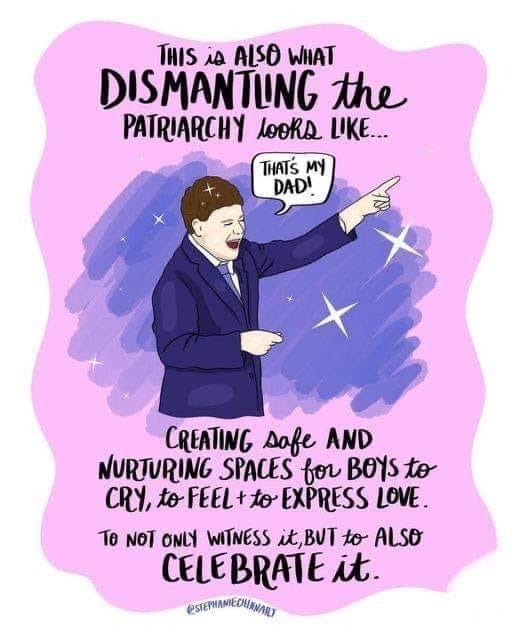Gus Walz & neurodivergent voices show us the humanity we need
Neurodivergent & disabled folk remind us how to be human (& not psychotic robots)
Admit it. You cried when you saw Tim Walz’s son Gus tear up at his dad’s speech at the DNC Wednesday night. Unless you were one of the psychopaths who mocked his tears.
The trolling underscored how mainstream Anglo-America still stigmatizes disability, neurodivergence, and feelings. Diversity, Equity, and Inclusion (DEI) are dirty words in some circles. Trump has mocked disabled reporters and said disabled people should die. When I lived and taught in conservative Orange County, parents argued with me about why so much money was spent on special education. (They also threatened me and my colleagues with “Remember who pays your salary.”)
As the mother of a disabled, autistic daughter, I will advocate ‘til I’m blue in the face. As a mom to a middle school boy, I also have a front-row seat to mainstream American culture. I see my son’s desire to shed all traces of sensitivity so he feels safe. I see how weakness and nonconformity get you bullied. His sister, to his lament, doesn’t typically try to hide her differences.
When Trump was elected president after saying John McCain wasn’t a war hero because he got captured, I worried about the message we were teaching our kids. When Trump claimed that people who died in the war were “losers” and suckers,” I wondered how to explain to my kids how a bully psychopath ascended to the most powerful position in the land.
My son quickly learned that power and dominance mean safety. Disabled and neurodivergent people typically enjoy neither power nor dominance. As a hypersensitive, neurodivergent child, I also hid in the bathrooms during P.E. Yet, we need non-normies more than ever now to show us a way out of the mess we’ve gotten ourselves into.
Like Walz, I’ve said my child’s autism is her secret power. Now I know that such words can be harmful in that they minimize the real struggle disabled and neurodivergent people go through. But I also believe my daughter’s sensitivity, empathy, and stick-to-it-ness are what the world needs to solve many of its problems.
Mainstream American culture prioritizes neurotypical traits that perpetuate the hamster wheel of capitalism: competitiveness, extroversion, lack of emotion, hustle culture, rationalism, and linear thought. However, we need my daughter’s and Gus Walz’s sensitivity to sense when things are off or unsafe. We need my daughter’s rock-like stubbornness to work hard on a project until it is finished. We must cultivate empathy and stop the myth that we are all independent, siloed parts. Because when we take care of each other, we take care of ourselves.
It’s hard to be physically and emotionally sensitive, medically fragile, feeling everyone’s pain and the suffering of the world. More than one time, I’ve wished away my neurodivergent “gifts.” But empathy and sensitivity keep us whole and human. If we lose that, then how are we any different from the robots who might one day enslave us?
The system wants us to be numb to keep us on an endless productivity cycle. This country was built on the suppression of humanity. How else did the settlers steal away Native children to boarding schools and distribute blankets full of smallpox in the name of “progress”? How else other than dehumanization could slavemasters enslave and torture African people for profit?
My refusal to self-numb is why I suffer from depression and anxiety. But this relentless, stubborn sensitivity and empathy is what the world needs now. We need our tears, Gus Walz’s, my daughter’s, and mine. 💞
If you like reading my work, please consider becoming a free or paid subscriber. Your support allows me to keep writing about culture, neurodiversity, and smashing capitalist patriarchy. Gunalchéesh!
🖤, Summer






It truly was a beautiful moment. May authenticity be the tapestry that weaves our future.
Being neurospicy can often be a superpower.
Our starting gate is a bit further back compared to where neurotypical people start. But once we catch up to where others started, we often ride that momentum to greater success.
I prefer the term neurospicy because it indicates our strength.
The term neurodivergent emphasizes our perceived weakness.